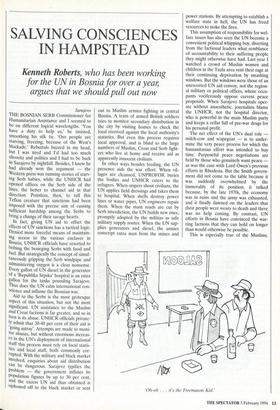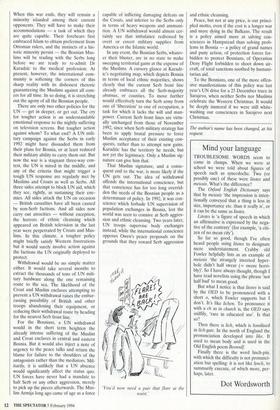SALVING CONSCIENCES IN HAMPSTEAD
Kenneth Roberts, who has been working
for the UN in Bosnia for over a year, argues that we should pull out now
Sarajevo THE BOSNIAN SERB Commissioner for Humanitarian Assistance and I seemed to be on different logical wavelengths. 'You have a duty to help us,' he insisted, smoothing his silk tie. 'Our people are starving, freezing, because of the West's blockade.' Rebuttals buzzed in my head, but I was tired and I'd had too much slivovitz and politics and I had to be back in Sarajevo by nightfall. Besides, I knew he had already won the argument — the Western press was running stories of starv- ing Serb babies, while the UNHCR had opened offices on the Serb side of the lines, the better to channel aid in that direction. Pointless, then, to tell this Teflon creature that sanctions had been Imposed with the precise aim of causing sufficient hardship among the Serbs to bring a change of their savage hearts.
In fact, giving UN aid to offset the effects of UN sanctions has a tactical logic. Denied more forceful means of maintain- ing access to the various enclaves in Bosnia, UNHCR officials have resorted to bribing the besieging Serbs with food and fuel. But strategically the concept of simul- taneously gripping the Serb windpipe and administering oxygen is a clear nonsense. Every gallon of UN diesel in the generator of a 'Republika Srpska' hospital is an extra gallon for the tanks pounding Sarajevo. Thus does the UN calm international con- science and inflame the Bosnian war.
Aid to the Serbs is the most grotesque aspect of this situation, but not the most significant. UN assistance to the Muslim and Croat factions is far greater, and so in turn is its abuse. UNHCR officials private- !), admit that 30-40 per cent of their aid is going astray'. Attempts are made to moni- tor i abuses, but without enormous increas- es n the UN's deployment of international staff this process must rely on local statis- tics and local staff, both commonly cor- rupted. With the military and black market involved, enquiries about aid distribution can be dangerous. Sarajevo typifies the problem — the government inflates its population figures by up to 30 per cent, and the excess UN aid thus obtained is siphoned off to the black market or sent out to Muslim armies fighting in central Bosnia. A team of armed British soldiers tries to monitor secondary distribution in the city by visiting homes to check the food received against the local authority's statistics. But even this process requires local approval, and is blind to the large numbers of Muslim, Croat and Serb fight- ers who live at home and receive aid as apparently innocent civilians.
In other ways besides feeding, the UN presence aids the war effort. When vil- lages are cleansed, UNPROFOR buries the bodies and UNHCR caters to the refugees. When snipers shoot civilians, the UN applies field dressings and takes them to hospital. When shells destroy power lines or water pipes, UN engineers repair them. When the main roads are cut by Serb interdiction, the UN builds new ones, promptly adopted by the militias as safe military supply routes. When the UN sup- plies generators and diesel, the armies conscript extra men from the mines and power stations. By attempting to establish a welfare state in hell, the UN has freed resources to stoke the fires.
This assumption of responsibility for wel- fare issues has also seen the UN become a convenient political whipping boy, diverting from the factional leaders what semblance of accountability to their suffering people they might otherwise have had. Last year I watched a crowd of Muslim women and children in the Tuzla area vent their rage at their continuing deprivation by smashing windows. But the windows were those of an unescorted UN aid convoy, not the region- al military or political offices, whose occu- pants vociferously oppose current peace proposals. When Sarajevo hospitals oper- ate without anaesthetic, journalists blame the UNHCR, not the hospital director, who is powerful in the main Muslim party and keeps a cellar full of pre-war drugs for his personal profit.
The net effect of the UN's dual role — milch-cow and scapegoat s— is to under- mine the very peace process for which the humanitarian effort was intended to buy time. Purposeful peace negotiations are held by those who genuinely want peace as was the case with Lord Owen's previous efforts in Rhodesia. But the Smith govern- ment did not come to the table because it was suddenly overwhelmed by the immorality of its position; it talked because, by the late 1970s, the economy was in ruins and the army was exhausted, and it finally dawned on the leaders that their people were weary to death and there was no help coming. By contrast, UN efforts in Bosnia have convinced the war- ring factions that they can hold on longer than would otherwise be possible.
This is especially true of the Muslims.
'Oh-oh . . . it's the Freemason Kid.'
When this war ends, they will remain a minority islanded among their current opponents. They will have to make their accommodations — a task of which they are quite capable. Their forebears first embraced Islam to obtain preferment from Ottoman rulers, and the instincts of a his- toric minority persist — the Bosnian Mus- lims will be trading with the Serbs long before we are ready to re-admit Dr Karadzic to the medical profession. At present, however, the international com- munity is softening the corners of this sharp reality with its dishonest rhetoric guaranteeing the Muslims against all corn- ers for all time. In so doing, it is stretching out the agony of all the Bosnian people.
There are only two other policies for the UN — get in deeper, or get out. The cry for tougher action is an understandable emotional response to the nightly suffering on television screens. But tougher action against whom? To what end? A UN mili- tary campaign against the Serbs in early 1992 might have dissuaded them from their plans for Bosnia, or at least reduced their military ability to carry them out. But now the war is a stagnant three-way con- test, the UN is mired in the middle, and any of the criteria that might trigger a tough UN response are regularly met by Muslims and Croats as well as Serbs. All three sides attempt to block UN aid, which they see, rightly, as sustaining their ene- mies. All sides attack the UN on occasion — British casualties have all been caused by non-Serb factions. And all sides now carry out atrocities — without exception, the horrors of ethnic cleansing which appeared on British television in the last year were perpetrated by Croats and Mus- lims. In this climate, a tougher policy might briefly satisfy Western frustrations but it would surely involve action against the factions the UN originally deployed to protect.
Withdrawal would be no simple matter either. It would take several months to extract the thousands of tons of UN mili- tary hardware along the one remaining route to the sea. The likelihood of the Croat and Muslim enclaves attempting to prevent a UN withdrawal raises the embar- rassing possibility of British and other troops abandoning their equipment, or reducing their withdrawal route by heading for the nearest Serb front line.
For the Bosnians, a UN withdrawal would in the short term heighten the already intense suffering of the Muslim and Croat enclaves in central and eastern Bosnia. But it would also inject a note of urgency to the peace talks and return the blame for failure to the shoulders of the antagonists rather than the mediators. Mil- itarily, it is unlikely that a UN absence would significantly affect the status quo. UN forces have never had a mandate to halt Serb or any other aggression, merely to pick up the pieces afterwards. The Mus- lim Armija long ago came of age as a force capable of inflicting damaging defeats on the Croats, and inferior to the Serbs only in terms of heavy weapons and ammuni- tion. A UN withdrawal would almost cer- tainly see that imbalance redressed by overt or covert military supplies from America or the Islamic world.
In any event, the Bosnian Serbs, whatev- er their bluster, are in no state to make sweeping territorial gains at the expense of the Muslims. A cursory glance at Karadz- ic's negotiating map, which depicts Bosnia in terms of local ethnic majorities, shows clearly that the current Serb front line already embraces all the Serb-majority obstinas, or counties. To move further would effectively turn the Serb army from one of 'liberation' to one of occupation, a task for which it lacks the will and man- power. Current Serb front lines are virtu- ally unchanged from those of November 1992, since when Serb military strategy has been to apply brutal pressure to force Muslim acceptance of their existing con- quests, rather than to attempt new gains. Karadzic has the territory he needs, but not yet the legitimacy. Only a Muslim sig- nature can give him that.
That Muslim signature, and a conse- quent end to the war, is more likely if the UN gets out. The idea of withdrawal offends the international conscience, but that conscience has for too long overrid- den the needs of the Bosnian people as a determinant of policy. In 1992, it was con- science which forbade UN supervision of population exchanges in Bosnia, lest the world was seen to connive at Serb aggres- sion and ethnic cleansing. Two years later, UN troops supervise body exchanges instead, while the international conscience opposes Owen's peace proposals on the grounds that they reward Serb aggression waist.' and ethnic cleansing.
Peace, but not at any price, is our princi- pled motto, even if the cost is a longer war and more dying in the Balkans. The result is a policy aimed more at salving con- sciences in Hampstead than solving prob- lems in Bosnia — a policy of grand names and puny action, of protection forces for- bidden to protect Bosnians, of Operation Deny Flight forbidden to shoot down air- craft, of total sanctions soothed by humani- tarian aid.
To the Bosnians, one of the more offen- sive manifestations of this policy was last year's UN drive for a 25 December truce in Sarajevo, when neither Serbs nor Muslims celebrate the Western Christmas. It would be deeply immoral if we were still white- washing our consciences in Sarajevo next Christmas.



















































 Previous page
Previous page